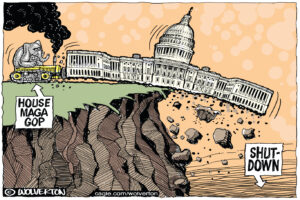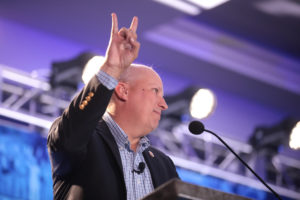March of the Deficit Pandas
It's possible to simultaneously worry about the debt and believe in an active and compassionate role for government. In fact, it's required.Don’t call me a deficit hawk. I’m a deficit panda.
If you care about preserving government programs, especially for the most vulnerable, you should be too.
The taxonomy of the budget debate is unintentionally but dangerously misleading. The term deficit hawk conjures images of a sharp-taloned raptor swooping down on government spending, preying on the defenseless elderly or seizing food from hungry children.
Hence my pitch for a cuddlier image. I would argue that it is possible to be a deficit panda: to simultaneously worry about the debt and believe in an active and compassionate role for government. In fact, I would argue that worrying about the debt is required of those who believe in such a government role.
Failing to deal with the debt will hurt everyone, but the neediest will suffer the most. The economy-wide consequences of doing nothing — higher interest rates, slower economic growth, lower standards of living — will hit hardest those least well off. Meanwhile, the budgetary reality of mounting interest costs will eat away at the government’s ability to provide a reliable safety net.
This point would seem obvious, except that too often the fiscal policy debate seems to be divided between grinch-like deficit hawks and caring big spenders. The progressive case for worrying about the debt too often goes unmade, and the players forget: Fiscal responsibility is, at bottom, moral responsibility. Fiscal crises are ultimately human crises.
The human face of the fiscal crisis was the focus of a conference last week sponsored by the Committee for a Responsible Federal Budget, and a paper by committee economist Anne Vorce.
Imagining America in 2050, Vorce sketched out two scenarios — “fiscal gridlock,” in which government leaders do not change the current, reckless course, and “fiscal recovery,” in which policymakers agree on a course to stabilize and ultimately reduce the debt. Then she examined how particular generations (baby boomers, Gen-Xers, millennials) and particular economic groups (the poor and working poor on the one hand, business and innovators on the other) would fare.
Take John, a 56-year-old baby boomer. He should have saved more for his retirement. So should his elderly parents, whom he is helping to support. So John is already going to be working longer than he expected.
“The effects of a fiscal crisis on John’s life will be harsh — and sudden,” Vorce writes. “If he is still in the work force when the crisis occurs, John will see job opportunities and income prospects dry up quickly…. To stay in business, firms will sharply cut expenses, including laying off the most costly (usually the most senior) employees, which could include our baby boomer. At a time when John is racing to maximize his retirement savings, being laid off means that he will have a lower standard of living in his senior years.”
And he will be more dependent on safety net programs. But by 2030, when John is in his mid-70s, Medicare will have run out of money to pay health care plans and providers. By 2040, when John is elderly and on a fixed income, Social Security will not have enough funds to pay him full benefits.
Then there’s Nick, 24, a new college graduate. He’s already struggling to find a decent job, and has staggering student loan debt. A fiscal crisis would make matters that much worse.
A fiscal recovery plan won’t necessarily be easy for Nick. In the short run, Vorce writes, “he can expect that fiscal tightening will lower growth and reduce his job opportunities.”
But things will get better as financial markets respond and growth improves. If Social Security and Medicare are put on a sustainable course, Nick won’t have to see his take-home pay dramatically reduced by the higher taxes needed to finance them.
Then there is the group about which we deficit pandas care most: the poor and working poor. They are at the greatest risk from a fiscal crisis, not merely because of the prospect of losing jobs. Higher interest rates would drive up housing costs, while budget pressures would further squeeze funds for public housing. Spending on education, from preschool through college, will be threatened. Income inequality will increase. Educational failures will slow economic growth.
Deficit pandas, unite. If we keep borrowing from, well, you know who, to buy our bamboo instead of going on a diet now, we’ll all suffer down the road.
Ruth Marcus’ e-mail address is marcusr(at symbol)washpost.com.
© 2011, Washington Post Writers Group
Your support matters…Independent journalism is under threat and overshadowed by heavily funded mainstream media.
You can help level the playing field. Become a member.
Your tax-deductible contribution keeps us digging beneath the headlines to give you thought-provoking, investigative reporting and analysis that unearths what's really happening- without compromise.
Give today to support our courageous, independent journalists.






You need to be a supporter to comment.
There are currently no responses to this article.
Be the first to respond.